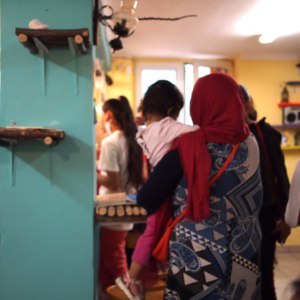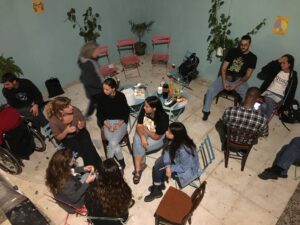ONE HAPPY FAMILY ATHENS
ANOTHER COOPERATION IS POSSIBLE
Working “with the people, not for the people” is the motto of OHF
Finding out how seriously they took it was the beginning of a very long journey for Maps
A journey that still continues
The history of One Happy Family talks about the spirit of the individuals that have founded it and their concept of hospitaly and cooperation. When in 2015 the Greek island of Lesvos was reached by an exceptional number of people fleeing the war in Syria and other risky contexts, it was evident that the structures set up by the institutions were insufficient and inadequate for what was going on.
A group of young people, mainly from Switzerland, spontaneously left their homes and riched Lesvos to offer their help. And they put themselves at service of those who needed help without imagining what these needs could be and, therefore, without bringing pre-packaged solutions. Above all, it was clear that they wanted to interact with the migrants as equals, away from the stigmatizing and dehumanizing models of the institutional mechanism.
Thus, an independent Community Center was born, separated from the Moria Reception Center – sadly known for the dramatic living conditions in which the migrants were stationed and that was then destroyed in the fire of 2020. The OHF Community Center was built from scratch together with the migrants and then, inside its compound, several services were gradually established: a school, a small shop for basic necessities, playgrounds and nursery for children, a workshop to repair telephones, small electrical appliances and bicycles, a hairdresser, a bar, a garden for growing crops and vegetables, a photography laboratory and much more. All were coordinated by equal collaboration between expatriate volunteers, other NGOs who joined and gave their contribution with specific services, and community volunteers, migrant people who offered their time and contribution.
MAPS came into contact with OHF when the emergency on the island, at least numerically, subsided, the rubble of the Moria camp led to new policies in the regulation of arrivals and a new camp, Kara Tepe, has born a few meters from the Community Center of OHF. At that point, the members of OHF asked MAPS to help them rethink the way in which the entire project of support for migrants has been carried out up to that moment, also in the light of the new challenges posed by contextual changes, by a wider and more complex organization compared to the beginning, but with the constant desire to offer help by working with the people effectively.
Starting from the MAPS system analysis, a consultancy collaboration led to the elaboration of a plan for moving the main project, the Community Center, from Lesvos to the capital Athens where the need to support migrants is constantly growing, strengthening the collaboration between the Swiss Board of the association and the staff engaged on the ground and, above all, constantly seeking a balanced way of operating that allows not to betray the initial spirit of working side by side with migrants despite all the organisational, contextual and cultural challenges that this entails.